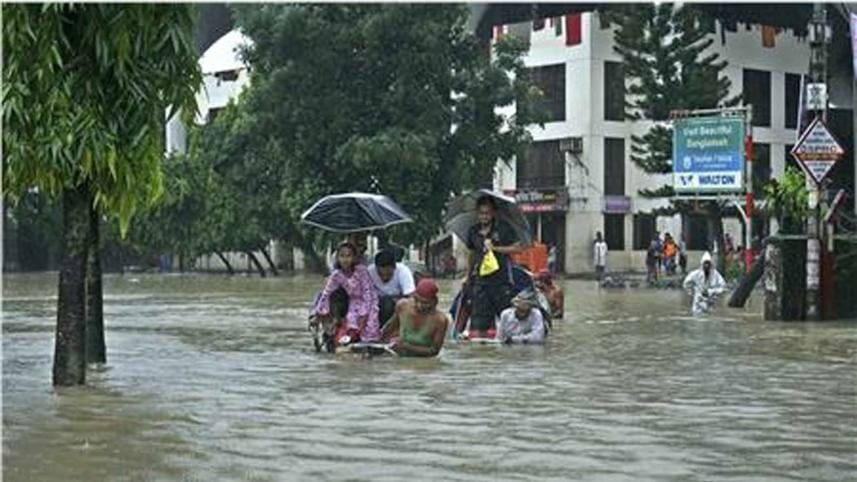Why not declare Sylhet, Sunamganj as ‘disaster zones’?

It was pitch-dark when I entered Sylhet MAG Osmani Medical College Hospital on Saturday afternoon. The ground floor was submerged in knee-high floodwater. I climbed up the stairs to the first floor to find an elderly patient named Ana Miah lying on the floor.
As the ground floor of the hospital got flooded that morning, all the patients were moved to the first floor. Ana Miah was struggling to breathe, no oxygen available for him as the central oxygen line had been disconnected, thanks to the power outage that engulfed not just the hospital, but the entire Sylhet district.
While this is the scenario in the city, one can only imagine the suffering the people in the remote areas of Sylhet and Sunamganj have been enduring since Wednesday. Just imagine: Your house is under floodwater, there's no electricity, your phone is out of charge and mobile network, there's no food or any hope of being rescued.
People from outside the flooded region, who have family members and/or friends stranded in the area, are similarly distressed as they can't contact their loved ones. Social media is swamped with posts from worried users seeking any update about their stranded loved ones or any information of rescue attempts.
After several attempts, I managed to establish contact with some remote areas. All I heard was people in distress, pleading to be rescued. Even the shelters in the remote areas are waiting for relief.
All means of connectivity are gone. One can hardly find a boat to wade through the flood; the boatmen who are willing to give a ride are asking for an exorbitant amount of fare. Sylhet Deputy Commissioner Md Mozibor Rahman said even the administration is struggling to find boats to extend rescue and relief work to the remote areas. Police, army, navy and Border Guard Bangladesh (BGB) personnel, as well as the general public, are trying to provide help in any way possible.
But what shocks me is the nonchalant attitude of our public representatives. Most of the MPs, upazila and union chairmen, and city and municipality councillors are absent in this moment of crisis. Only a few people, like Expatriate Welfare and Overseas Employment Minister Imran Ahmed, were seen coming to his constituency to extend humanitarian support to the distressed people.
And I have been seeing a general lacklustre attitude towards flood management for a while. Since the flash floods in 2017 destroyed Boro harvest in the country's northeast region, I have been constantly searching for a concrete explanation as to why floods have been so devastating in the region in recent times.
The answer is complex. Experts have tried to explain it in many ways, but it boils down to a combination of climate change, destruction of hills, deforestation, unplanned development work in the wetlands, and the massive loss of navigability in all the rivers in the upper and lower Meghna basin.
All of these reasons are the results of human actions.
Has the government come up with any solutions to manage floods? I see none. After repeated calls from concerned citizens, it is rather disappointing to see the government only focused on infrastructural development, with little to no concern about conserving nature and the environment.
Several concerned organisations and citizens have already urged the authorities to declare the flood-affected areas as a "disaster zone," per the Disaster Management Act, 2012. Doing so will empower the local administrations to work more extensively and ease getting adequate support from all government offices.
The flood is just the beginning of the disaster. It will take months to rehabilitate the affected population and rebuild what has been damaged by the calamity. I hope the authorities concerned are preparing for that.
Dwoha Chowdhury is a journalist at The Daily Star.




 For all latest news, follow The Daily Star's Google News channel.
For all latest news, follow The Daily Star's Google News channel.
Comments